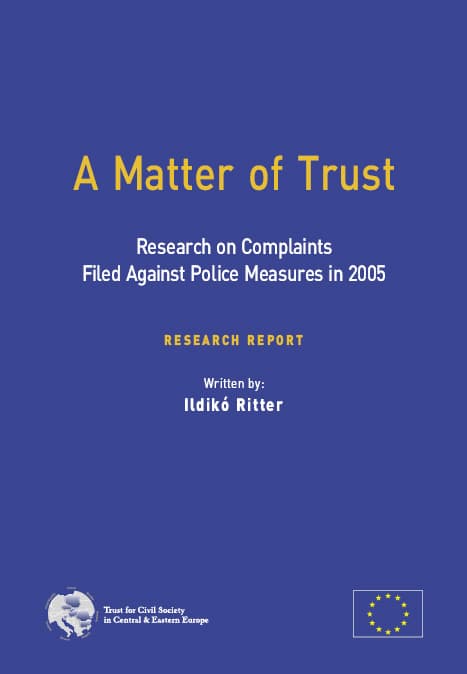A Matter of Trust – Research on Complaints Filed Against Police Measures in 2005
Author: Ildikó Ritter
Hungarian Helsinki Committee, Budapest, 2008
ISBN: 978-963-87757-2-6
Translation is available for this content
Váltás magyarra
The Hungarian system of complaints against unlawful police action has been criticised being dysfunctional due to systemic and procedural reasons. The most important flaw was that the police rather than an independent body decided all complaints. The institutional culture of this military-type organization is still characterized by lack of transparency and strong internal loyalty. Senior police leaders usually do not act with sufficient firmness against violations committed by their colleagues, therefore often even obvious violations of law are deemed lawful, few complaints are submitted and practically all are rejected.
In 2007, The Hungarian Helsinki Committee launched a program with the support of the Trust for Civil Society in Central andEastern Europe, in order to incite the reform considering the police complaints’ procedure. The Committee aspired to identify problems in legislation and practice that were the causes of the complaints system’s ineffectiveness, and to raise awareness of the need to make the system of complaints more effective in Hungary. (The program of the roundtable, organized by the HHC and the Hungarian Civil Liberties Union in April 2007 about the police complaint mechanisms, may be downloaded here.) The Committee advocated for establishing an independent police complaints body, showed examples of good practice from other EU member states and also proposed a model law to be considered for adoption by Hungarian law-makers. In 2008, the HHC published a report on the research under the title ‘A Matter of Trust’, which analyzed the typical reasons of the complaint procedures, their outcomes, and the lessons drawn through the examination of the files of 200 complaints.
